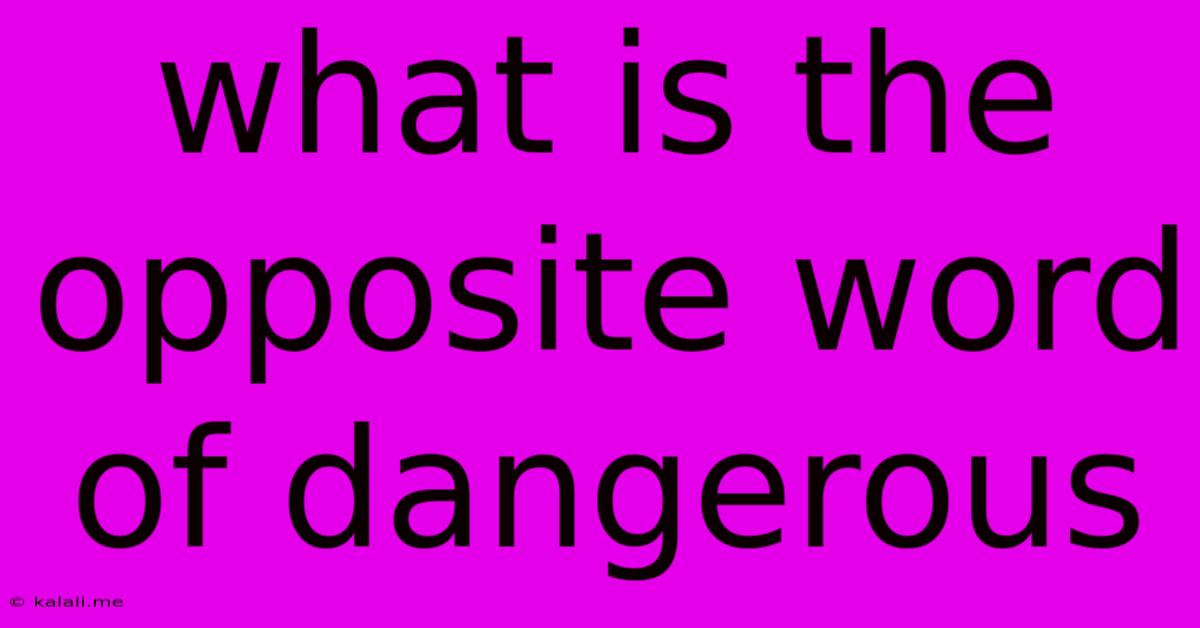What Is The Opposite Word Of Dangerous
Kalali
Jun 16, 2025 · 2 min read

Table of Contents
What is the Opposite of Dangerous? Finding the Right Antonym
The opposite of dangerous depends heavily on the context. There isn't one single perfect antonym, as "dangerous" encompasses a wide range of meanings relating to risk, peril, and hazard. This article will explore several options and help you choose the most appropriate word depending on your specific situation. Understanding the nuances of language is crucial for clear communication and effective writing.
Understanding the Nuances of "Dangerous"
Before we dive into potential opposites, let's consider what "dangerous" actually means. It describes something that poses a threat or risk of harm, injury, or death. This harm can be physical, emotional, or even financial. The severity of the danger can also vary greatly. This context-dependent meaning is why a single antonym is insufficient.
Common Antonyms and Their Contexts
Here are some words often used as opposites of "dangerous," along with examples illustrating their appropriate usage:
-
Safe: This is probably the most common and straightforward antonym. It implies freedom from danger or risk.
- "The neighborhood was once considered dangerous, but now it's completely safe."
-
Secure: This suggests protection from harm or loss. It implies a state of being protected.
- "The vault was designed to be secure, protecting valuable items from theft."
-
Harmless: This indicates an inability or lack of intention to cause harm.
- "The spider looked frightening, but it was actually harmless."
-
Innocuous: Similar to harmless, but often implies a lack of noticeable effect or impact.
- "The comment, while seemingly innocuous, caused a great deal of controversy."
-
Risk-free: This explicitly refers to the absence of risk.
- "There's no such thing as a risk-free investment."
-
Benign: This usually refers to something that is not harmful or malignant, often used in medical contexts.
- "The tumor was benign and required no treatment."
Choosing the Best Antonym
The best antonym for "dangerous" depends entirely on the context. Consider the type of danger you're describing and the specific nuance you want to convey.
-
For physical dangers: "Safe" or "secure" are usually the best choices.
-
For situations with potential harm: "Harmless" or "innocuous" might be more suitable.
-
For financial risks: "Risk-free" is a precise antonym.
-
For medical contexts: "Benign" is often the most appropriate.
Beyond Simple Antonyms: Consider Alternatives
Sometimes, a simple antonym doesn't fully capture the intended meaning. In such cases, consider using descriptive phrases that convey the opposite idea more effectively. For example, instead of saying "the opposite of a dangerous animal is a safe animal," you might say "the opposite of a dangerous animal is a docile and gentle creature." This adds more detail and paints a clearer picture.
Mastering the art of choosing the right word, even when selecting antonyms, significantly enhances the clarity and impact of your writing. By understanding the subtle differences between seemingly similar words, you can achieve precision and sophistication in your communication.
Latest Posts
Latest Posts
-
A 10 Ft Ladder Is Leaning Against A Wall
Jun 16, 2025
-
Yonsei University Acceptance Rate For Foreign Students
Jun 16, 2025
-
Choose The Incorrect Statement About The Fusion Process
Jun 16, 2025
-
Which Of The Following Is True About Veins
Jun 16, 2025
-
Doubly Linked List Vs Singly Linked List
Jun 16, 2025
Related Post
Thank you for visiting our website which covers about What Is The Opposite Word Of Dangerous . We hope the information provided has been useful to you. Feel free to contact us if you have any questions or need further assistance. See you next time and don't miss to bookmark.